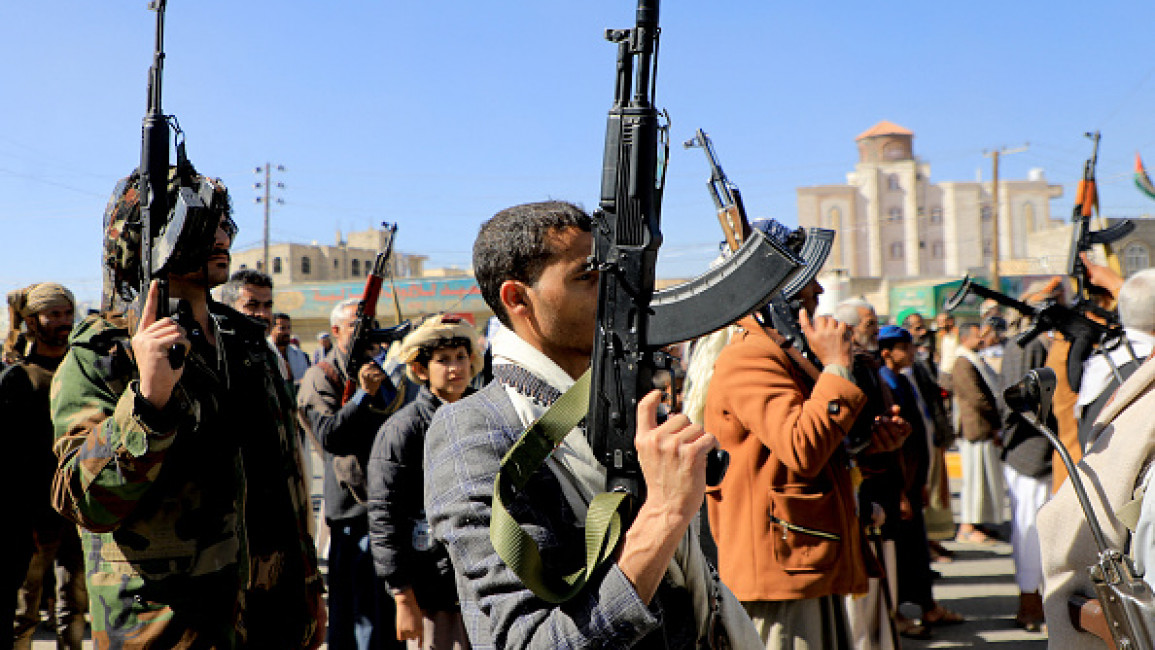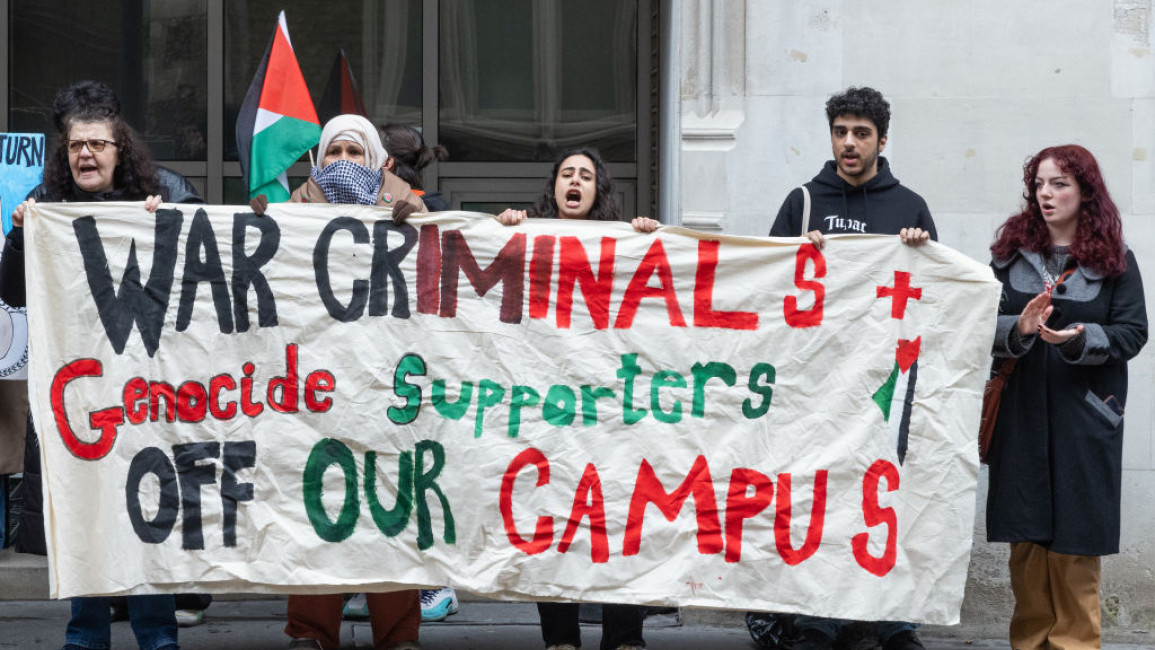US, UK strike Yemen's Houthis: How did the world react?
The international community is split after the US and UK bombed Yemen in the early hours of Friday morning, threatening to drag the region into further conflict.
US and UK forces said they bombed Houthi rebel sites in Yemen following weeks of attacks on shipping lanes in the Red Sea, which have threatened global trade in one of the world’s most important maritime trade routes.
The Houthis say they are targeting vessels either linked to Israel or heading to Israeli ports to pile pressure on global powers to end the brutal war on Gaza, which has killed over 23,000 people, most of them women and children.
The Yemeni rebel group has vowed to retaliate to the US and UK strikes.
Who are the Houthis?
Emerging in the 1990s, the Houthis, or Ansarullah, are a Zaydi Muslim movement backed by Iran. They completely overran the Yemeni capital Sanaa in September 2014, forcing the internationally recognised government to flee to Aden in the country’s south.
They have been engaged in a conflict with a Saudi-led military coalition since March 2015, and still control much of Yemen’s north and west including Sanaa, Hodeida, and other major cities.
While Yemen has witnessed relative calm in the past year due to a truce with Riyadh, the war has killed tens of thousands of people and displaced millions more in the Arab world’s poorest country. Millions of people still face the threat of hunger and starvation.
The Houthis have been engaged in direct talks with Saudi Arabia recently, but the negotiations are yet to yield any permanent political solutions.
First strikes on Yemen
Friday’s strikes come after several warnings to the Houthis from the US, UK, and the UN to immediately halt their attacks in the Red Sea.
President Joe Biden said that US and British forces had launched air strikes against the Houthis in "defensive action" after attacks on shipping in the Red Sea.
In a statement, Biden said he "will not hesitate" to order further military action if needed.
Air strikes hit several cities in Yemen, including the capital Sanaa, a Houthi source and witnesses said.
The strikes involved fighter jets and Tomahawk missiles, several US media outlets said.
"Despite the announcement of the US-led Prosperity Guardian Operation, it's unlikely to deter Houthi attacks, given their previous actions, even with a similar naval presence"
— The New Arab (@The_NewArab) January 3, 2024
What do Houthi attacks in the Red Sea mean for global trade? ⬇️https://t.co/PlXqwtXAj3
Five were reportedly killed, but this could not be immediately verified.
Washington had already previously announced a multinational maritime task force to patrol Red Sea waters in an effort to intercept Houthi drones and missiles, either heading toward commercial ships or Israel.
The US blames Iran for abetting Houthi attacks, a claim Tehran denies.
The Houthi movement seems to have become emboldened by other Iran-backed factions in the region; Lebanon’s powerful Hezbollah group has traded cross-border fire with Israel since October, and Shia militias in Iraq and Syria are targeting US troops.
All these armed groups have vowed to continue striking Israeli and US interests in the Middle East until Israel’s onslaught on Gaza stops.
Countries in favour of strikes
Some countries cheered the strikes on Yemen and expressed support for any further military action.
In Washington, however, many Senators and members of Congress said that while they believed deterring the Houthis was necessary, they did not support being dragged into a broader conflict.
US allies including Japan, Australia, and Denmark came out in support of the attacks.
"We condemn the Houthis’ continued interference in the rights and freedoms of navigation in the waters surrounding the Arabian Peninsula, especially in the Red Sea," Japan’s foreign ministry said in a statement.
"The American-British strikes against the Houthis in Yemen were a measure aimed at preventing further deterioration of the safe navigation situation for ships."
For Somaliland, the government's agreement was based on its desire to obtain international recognition
— The New Arab (@The_NewArab) January 9, 2024
Ethiopia's Red Sea port deal: A brewing conflict in the Horn of Africa? ⬇️https://t.co/g5pnOsFXKN
Australian Defence Minister Richard Marles said his country provided personnel support to the US and UK in their strikes.
"Australia's support of these actions came in the form of personnel in the operational headquarters," Marles told a news conference on Friday, adding that Canberra will continue to support any such actions "which assert the global rules-based order."
Denmark, home to shipping giant Maersk – one company that had to temporarily halt journeys through the Red Sea because of the Houthi attacks – said it also fully supports the strikes.
"It will come with a huge bill if the Houthis succeed in forcing international shipping traffic away from the Red Sea and the Suez Canal. 12% of all civilian ships sail through exactly that strait," said Danish Foreign Minister Lars Lokke Rasmussen in a statement on Friday.
Countries and groups against the strikes
Other governments and world leaders are alarmed by the escalation in the conflict.
They believe the strikes could further complicate any prospects for a ceasefire in Gaza, following the assassinations of senior commanders in Hamas, Hezbollah, and Iraqi groups this month.
Neighbour Oman condemned the strikes by "friendly countries" and said it was following the developments with "great concern".
Iran, the Houthi group’s main backer, blasted the US and UK over the strikes.
Iranian foreign ministry spokesman Nasser Kanani said in a statement that the strikes were "an arbitrary action, a clear violation of the sovereignty and territorial integrity of Yemen, and a violation of international laws and regulations".
Hezbollah in a statement said: "The American aggression confirms once again that the US is a full partner in the massacres and tragedies committed by the Zionist enemy in Gaza and the region."
Analysis: Deadly US airstrikes in Iraq make Baghdad's balancing act increasingly difficult as it seeks to contain the ripple effects of Israel's war on Gaza
— The New Arab (@The_NewArab) January 11, 2024
Why US airstrikes in Iraq add to fears of a regional war ⬇️
✍️ @GiorgioCafierohttps://t.co/DdAjaCZcx3
Russia on Friday also condemned the strikes as an "escalation" with "destructive objectives".
"The US strikes on Yemen are a new example of disinformation by the Anglo-Saxons... and a total violation of international law aimed at an escalation in the region to attain their destructive objectives," foreign ministry spokeswoman Maria Zakharova said on Telegram.
China called Friday for all sides to prevent the Yemen conflict from expanding, calling on "the relevant parties to keep calm and exercise restraint".
Beijing’s calls were echoed by Saudi Arabia, whose foreign ministry said it was closely monitoring the situation with "great concern."
Jordan’s Foreign Minister Ayman al-Safadi, whose country has seen worsening ties with Israel, particularly since the start of the Gaza war, accused Israel of "pushing the entire region towards more wars by continuing its aggression against Gaza and trying to open new fronts and drag the West into them."



